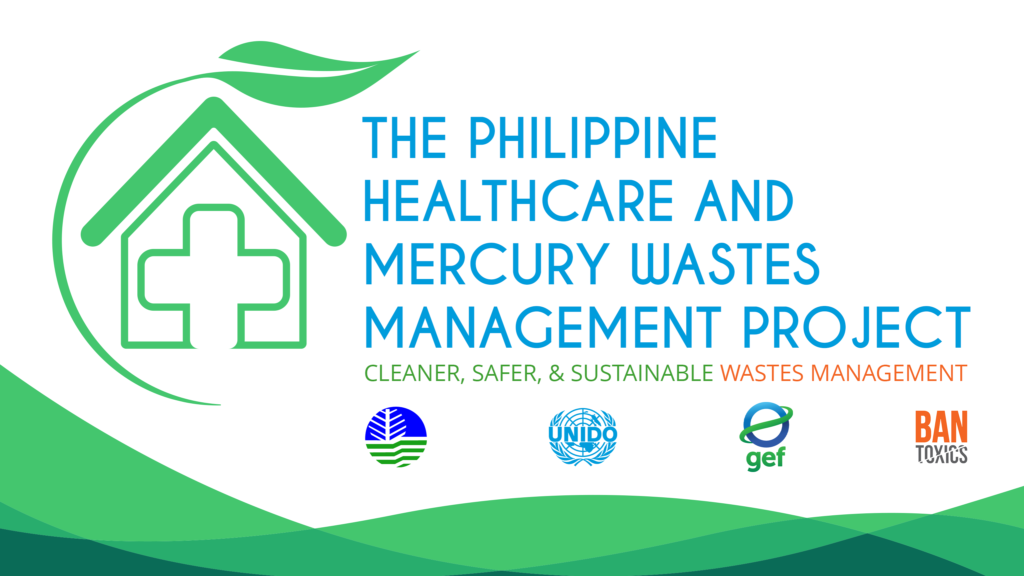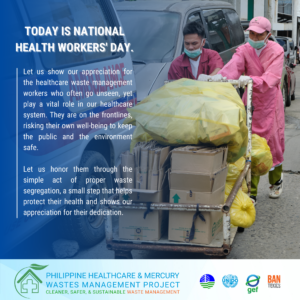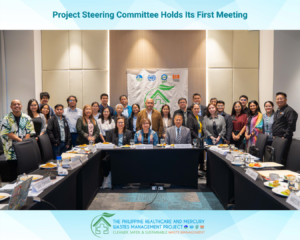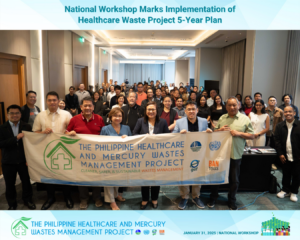
Background
The healthcare sector is growing at a very rapid pace, resulting in a tremendous increase in the quantity of healthcare waste generated. The recent global COVID-19 pandemic has further intensified this challenge, leading to a significant increase in the generation of infectious wastes.
Healthcare waste (HCW) refers to all wastes generated as a result of any of the following activities such as: diagnosis, treatment, or immunization of human beings and research pertaining to these activities, research using laboratory animals for the improvement of human health, production or testing of biological and other activities performed in all healthcare facilities. HCW includes a broad range of materials, from used needles and syringes to soiled dressings, body parts, diagnostic samples, blood, chemicals, pharmaceuticals, medical devices, and radioactive materials. As such, improper or poor management of these wastes may potentially expose healthcare waste management workers and personnel, patients, and the community to health risks. It may also threaten the quality of the environment through environmental contamination.
The World Health Organization estimates that approximately 85% of the waste generated by healthcare activities is classified as general, non-hazardous waste, akin to domestic waste. The remaining 15% is deemed hazardous material, encompassing infectious, chemical, or radioactive elements.1 Before the pandemic, there was already insufficient disposal capacity in the country to safely treat an estimated 55,749 tons of infectious waste generated per year, based on 2018 data.2
Key Challenges
The global COVID-19 outbreak placed an immense strain on societies and economies around the world, including the Philippines. Healthcare systems in the country, unprepared to face a health crisis of this scale and magnitude, were put under pressure, facing shortages of facilities, manpower, medical equipment, and supplies of PPE, and challenges with the management of excessive healthcare wastes. The pandemic has caused a significant ramp-up of the generation of infectious wastes associated with single-use PPE (face masks, gloves, gowns), both from households and hospitals, increased usage of medical devices containing mercury, and a massive increase in the use of chlorine-based chemicals for disinfection.
Based on the online hazardous waste management system of the DENR-EMB, an estimated 480% increase in hazardous and infectious wastes was recorded during the height of the pandemic from June 2020 to December 2021.3
Meanwhile, at a global level, the mercury emissions generated through the unsound management of mercury-containing healthcare waste is significant. In 2015, global-level emissions from unsound management of mercury-added products (MAPs) comprised about 7% of the total global Hg emissions (around 155 tons).4 Emissions in the Philippines generated by MAPs are estimated to be around 40 tons per year. Around 25% of this emission is caused due to the unsound management of mercury-containing healthcare wastes.5 Healthcare wastes also include mercury-containing medical devices such as thermometers and sphygmomanometers, as well as lighting products used in the healthcare sector. It is also used in procedures conducted in laboratories, clinics, hospitals, dental clinics and other healthcare facilities. Weak capacities and fragmented policies, however, led to existing undisposed mercury from these sources amounting to an estimated 10,480 tons of Hg in 2018.6
Ways Forward
The Philippines has to address a number of root causes and barriers to ensure that healthcare care waste is managed in an environmental, social and economic sustainable manner. The major root causes identified in the management of the healthcare waste sector in the Philippines include: (i) Local Government Units (LGUs) tasked to manage waste management, in general, are not capable to handle medical and hazardous wastes; (ii) Lack of service providers for the management of mercury wastes and; (iii) Incoherent policies on healthcare waste management, in general.
With support from the Global Environment Facility (GEF), the Philippines aims to improve healthcare waste (HCW) management by refining policies, regulations, and standards. The plan includes exploring alternatives to the growing reliance on PPEs and chemical-based disinfectants, fostering the production of these alternatives, introducing innovative HCW treatment technologies, conducting environmental monitoring, advocating for environmental protection, and boosting public awareness. The same goal is envisioned for the management of mercury, mercury-added products (MAPs), and mercury wastes in the health sector.
The GEF has approved the project in October 2022 for a five-year implementation. The project will be implemented by the United Nations Industrial Development Organization (UNIDO) and will be nationally led by the Department of Environment and Natural Resources-Environmental Management Bureau (DENR-EMB), with the assistance of environmental justice group BAN Toxics.
[1] WHO, 2018. Health-care waste. Geneva, WHO. Available from: https://www.who.int/news-room/fact-sheets/detail/health-care-waste.
[2] EMB-DENR, 2018. Hazardous Waste Management System. Quezon City, EMB-DENR. Available from: https://hwms.emb.gov.ph/.
[3] EMB-DENR, 2021. Hazardous Waste Management System. Quezon City, EMB-DENR. Available from: https://hwms.emb.gov.ph/.
[4] UN Environment, 2019. Global Mercury Assessment 2018. UN Environment Programme, Chemicals and Health Branch Geneva, Switzerland
[5] Monroy, T., 2018. Philippine Mercury Inventory Report 2018: The Philippine Minamata Initial Assessment Report. Manuscript in Preparation. Quezon City, DENR.
[6] Ibid.
More about the PHCWMP
- Honor Our Healthcare Waste Workers This Health Workers’ Day
 On May 7th of every year, the nation celebrates Health Workers’ Day by virtue of Republic Act 1009, to recognize the invaluable contributions of those who work in the healthcare…
On May 7th of every year, the nation celebrates Health Workers’ Day by virtue of Republic Act 1009, to recognize the invaluable contributions of those who work in the healthcare… - Project Snapshots | Healthcare Waste Project Visits Potential Hospital Partners in Mindanao
 The Philippine Healthcare and Mercury Wastes Management Project (HCW Project), led by the DENR–Environmental Management Bureau (EMB) and BAN Toxics, visited three hospitals in Mindanao to engage potential partners in…
The Philippine Healthcare and Mercury Wastes Management Project (HCW Project), led by the DENR–Environmental Management Bureau (EMB) and BAN Toxics, visited three hospitals in Mindanao to engage potential partners in… - Unite for All Women Forum Champions Gender Equality, Economic Growth, and Environmental Action
 PRESS RELEASE | 7 March 2025 In celebration of International Women’s Month 2025, UNIDO Philippines, in partnership with Artisanal Gold Council Philippines, BAN Toxics, and Clean Air Asia, hosted “Unite…
PRESS RELEASE | 7 March 2025 In celebration of International Women’s Month 2025, UNIDO Philippines, in partnership with Artisanal Gold Council Philippines, BAN Toxics, and Clean Air Asia, hosted “Unite… - In Photos: HCW Project Steering Committee Holds Its First Meeting
 On January 30, 2025, the Project Steering Committee (PSC) of the Philippine Healthcare and Mercury Wastes Management Project (HCW Project) held its inaugural meeting to finalize the project’s five-year work…
On January 30, 2025, the Project Steering Committee (PSC) of the Philippine Healthcare and Mercury Wastes Management Project (HCW Project) held its inaugural meeting to finalize the project’s five-year work… - Healthcare Waste Project Rolls Out Year One Implementation with National Workshop
 Quezon City – The Philippine Healthcare and Mercury Wastes Management Project (HCW Project) kicked off its five-year implementation with a national workshop on Friday, January 31, 2025, marking the end…
Quezon City – The Philippine Healthcare and Mercury Wastes Management Project (HCW Project) kicked off its five-year implementation with a national workshop on Friday, January 31, 2025, marking the end…
